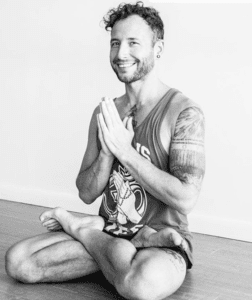Each of us has a unique set of programming, samskaras collected over a long time that guide us towards certain behaviors. Your story particulars may be different from mine, but the model of raga and dvesha discussed by Patanjali holds true. He describes these as attachment and aversion, built respectively on pleasure (sukha) and suffering (dukha).
Resentments are a terrible poison, easy to form and hard to let go of. Often our addict egos are easily injured, making us prone to recycling feelings of anger and blame over and over again. It’s a bitterness that breaks down our relationships and holds the power to destroy us from the inside–unless we take purposeful action.
Some amount of addiction response is common in most human beings. Some get over-attached to everything from exercise to caffeine, and sometimes even caffeine to get through our exercise. Others battle with far more serious dependency issues.
It can be a lifelong process of ups and downs to liberate oneself from these addictions. In recovery, we use an analogy, “…if you sober up a horse thief, what do you get? A sober horse thief.” What we are, the set of core beliefs and behaviors that define us, hold tight to us, as if magnetized.
While some respond to the pain of being stuck in that destructive cycle with self-medication, others live a life wrapped up in anger and self-pity. One can end up drunk on these destructive feelings as well. Substance abuse is just one possible symptom of a deeper imbalance.
Ancient yogis called the impressions left by repetitive actions Samskaras. Sometimes these impressions stem from innocuous behaviors. If you follow the same path to work each day, you may eventually find yourself driving there on autopilot, lost in thought on matters other than the road in front of you.
Similarly, unhealthy behavior patterns and unresolved trauma can make us act unconsciously or leave us with a feeling of being unable to make a different choice though we know something is wrong. Our thoughts and actions create grooves in the fabric of our reality, and oftentimes feelings of being wronged or that we are owed something can be among the most compelling to return to. Until we find the wherewithal to change course, some of us are always looking for the next horse to steal.
I found myself relapsing into pathological resentment many years into my sobriety. While living in Guatemala I had the privilege of working with a wonderful therapist who listened to me as I cautiously opened up on the workings of my mind.
One week I described to her the conflict between my sister and I. I told her how we often butted heads and how she had recently placed unrealistic demands on me to come back to the states for a visit. Later I spoke of my relationship with my husband and some challenges we faced. At the time I felt he didn’t see my sincere attempts to connect with him and his desire for more effort on my part felt to me like an off-putting neediness. He sought more intimacy and somehow I twisted that into an attack on what I was already offering.
A couple of sessions later she offered to connect some dots she had seen as I told my stories. In different words, she described how the samskaras of my childhood left me with out-of-balance ideas about opportunity and expectation. Simple requests often feel like demands to me and the demands lead to feelings of being stressed and stuck in a cycle of blind blame. Having a mother who didn’t seem to need me left me habitually uncomfortable with being needed, and in some cases even left me resentful, confused, and doubtful about love.
Each of us has a unique set of programming, samskaras collected over a long time that guide us towards certain behaviors. Your story particulars may be different from mine, but the model of raga and dvesha discussed by Patanjali holds true. He describes these as attachment and aversion, built respectively on pleasure (sukha) and suffering (dukha).
While not all samskaras have to do with resentment, many of these patterns do bring us what feels like comfort and a sense of relief, so naturally, we become defensive and resentful when they are challenged.
Early in my sobriety, I had a patient sponsor, a mentor who taught me to take a moment before bed and review the day’s events. If I had caught any resentments, she taught, it’d be best to make amends and find forgiveness right away. This is in some ways a very yogic ideal of trying to skillfully control the mind, moving away from operating unconsciously and towards presence and intentionality.
Taking this daily inventory of resentments is challenging because the party that injured you may not always be as willing to let go, but a thorough investigation of the situation often reveals that they may not have awareness of the harm they are causing. It can be empowering to see the limited perspective of others. We addicts must accept that often the behavior of others, even when it causes us pain, is the other doing the very best they can.
Very few people want to cause pain, but quite a few lack the self-awareness to know when it’s just this that is happening. This source of our resentment, rooted in the dukha of others, is very often the greatest opportunity to practice compassion and love.
A key to sobriety is looking for your role in each situation, taking responsibility for your part and opening up to forgiveness of others. This is a formula that works for most everyone:
1. Put it on paper, write out what you’re feeling. Get it out of your head and see the shape of your resentment in writing. Inquire: Does it look different now, is it as bad as it seemed? Vidya is the yogic term for seeing clearly and this technique may grant you some insight.
2. Ask yourself what your role is. Inquire: Did I do anything to make this worse? Rarely do we find that we have not contributed to the difficulty in any way. Getting honest about your part will help bridge the divide.
3. Let go. There is a satisfaction inherent in resentment. Even one who has never had a drink can get addicted to the feeling. Seek help from your higher power or spiritual counsel in letting go of the fear that draws you into holding tight to your resentment.
4. Pray for the person you resent, or meditate. Offer them loving kindness, open up to their suffering. If you can really feel how they hurt too, then forgiveness will be more accessible. Do this daily and you can retrain the tendency to hold a grudge.
5. Making amends is like an apology on steroids. Find tapas, the white-hot effort required to burn up samskaras of addictive behavior, by facing the person. Have no expectation for an apology in return, only a willingness to show how you are changing your own behavior.
Transforming samskaras into tools for insight is possible. The sutras say that future suffering is to be avoided and the digging deep into the roots of our resentment can help.
These right efforts towards compassion and forgiveness can play a valuable role in your yoga journey. The eightfold path which Patanjali lays out assumes a certain amount of emotional stability in the practitioner. The first Yoga Sutra even says ‘Now yoga begins’ and it is a purposeful arrangement of words.
That ‘now’ is full of meaning. It’s full of stolen horses, needy boyfriends and hearts broken by our mothers. It’s full of a raw sincerity that allows you to open up to your own sensitivity, your longing and fear and to take responsibility. It’s full of all those pivotal actions that will redefine your place in the world.
From the Big Book of AA:
“AA has taught me that I will have peace of mind in exact proportion to the peace of mind I bring into the lives of other people.”
By Joseph Armstrong

Joseph Armstrong teaches yoga rooted firmly in tradition but with an eye to the future. His search for a more present and peaceful life first led him to the practice in 2008. A few years later he was in India studying intensively. After finally overcoming a long struggle with addiction, Joseph began experimenting with Ashtanga Yoga. He understood quickly that the lineage was calling to him to deepen his practice. He underwent a 2 year apprenticeship program at the world renowned Miami Life Center, continuing his education under his dear teachers Tim Fieldmann and Kino MacGregor. More recently he has completed 2 months of study in Mysore under Sharath Jois. Joseph teaches yoga because attempts to do any and everything else ended disastrously. But when he finally devoted himself to his passion, he became an asset to himself and others. He hopes his practice allows him to be ever more loving and to exist gently.
Photo by Fabian Burghardt on Unsplash










